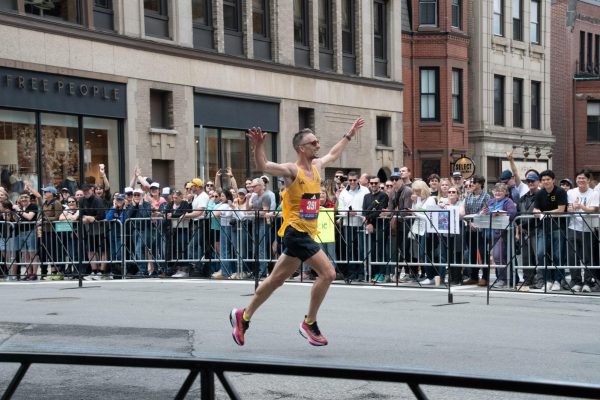The Future is Female: Why I marched in Boston
January 26, 2017
I participated in the Women’s March in Boston this weekend, and I am still a journalist.
Given how strict other news organizations such as The New York Times or National Public Radio are about their reporters joining protests or political demonstrations, this would seem to be a violation of etiquette and ethics. However, I think I’ve found a way to do it differently.
I covered local politics in my hometown for years. While my friends always knew where I stood, the Women’s March felt different when it came to objectivity. Back home, I couldn’t vote, and there aren’t as many large protests in Minnesota, so I never faced this issue the way I do now.
My internal conflict started when I read an article shared by a fellow journalist in a Facebook group. It was a week before the march, and I was deciding whether to attend. The piece talked about objectivity in the face of the anti-media culture and how, by not marching, journalists were upholding their democratic duty. I was instantly convinced.
A few days went by, and I thought I had made peace with sitting this one out. Then, another journalist shared a different article in the same Facebook group, which took the opposite stand. She questioned the perception of women fighting for equality as “biased.” Instead, she asked the reader to view them as “fair.” She pointed out that one of journalism’s functions is to level the playing field. Journalists are meant to fight for ethical conduct and a fair society. They are meant to hold our leaders accountable.
It is impossible to agree with both articles, but I managed to internalize that contradiction regardless. It was the day before the march and with very little time left to decide, I texted my dad both articles and held my breath for his response. We had a debate, as we often do, and he finally said, “Some issues are not opinions. Human rights are universal.”
So, I went to the march. While I was there, I didn’t hold a sign or chant loudly, but I did march. I was inspired by the speeches given by Sen. Elizabeth Warren (D-Mass.), Boston Mayor Martin J. Walsh and Boston NAACP President Tanisha Sullivan. At the end, we raised our right hands and pledged an oath to do something to make our communities better. I am glad I was there to hear that validation, because I realized how to make a stand—by using my journalism to lift up the voices and stories that are not always heard.
I will go out of my way to report the truth and to call out those who are spreading lies and fear because they want power. The next time I feel compelled to attend a march, like I felt about the Women’s March, I will make sure I am there with my notepad and a pencil. I will make sure that lies about protesting, about feminism and about equality do not stand.
I know many journalists have a problem with personal activism. They worry their audiences won’t see them as objective or independent, and those concerns are valid. I shouldn’t let my personal opinions interfere with my work, especially when dealing with polarizing issues.
On the other hand, I will not sit idly by as our new president and many of his supporters demean women and other marginalized groups. True objectivity is impossible—it isn’t a box to check or a line to cross. It means always revising my articles and seeking out other opinions. But the idea that sexism exists in this country isn’t an opinion. It is a fact.
I will never be on the front lines, organizing a march or demonstration—but I will be there, one speck in a sea of people, lifting up their anger, passion and inspiration until everyone is paying attention.

















